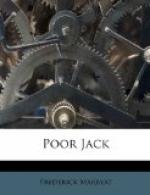The officer who had charge of the vessel now came on deck, and looked round him: he could speak English sufficient to carry on a conversation. The weather was very thick, and the rain drove down with the wind: he saw that it was impossible that the ship could be moved. He told us that we should have a hundred guineas each and our liberty if we took the ship safe either to Ostend or any French port. We replied that we should be very glad to do so, as it would be ten times as much as we should have received for piloting her up the Thames; and then we went down below. In the meantime the men were sent for on deck, divided into watches, and when the watch was set the others went down below again. After taking a glass or two of wine, for the Frenchmen had soon rummaged out what there was to be drunk in the cabin, Bramble and I returned on deck. We found the Frenchmen in charge of the watch diligent: one was looking out forward, another at the taffrail; the remaining three were walking the deck. Bramble went to the gangway, and I followed him.
“Tom, I see the hatchway grating is on deck—I only wish we once had them all beneath it.”
“I only wish we had all but the watch—I’d have a try for it then,” replied I.
“No, no, Tom, that wouldn’t do; but we must trust to Providence and a sharp lookout. See where you can put your hand upon a crowbar or handspike, in case you want it; but don’t touch it. Come, there’s nothing to be done in any way just now, so let’s go down and take a snooze for an hour or two; and, Tom, if they ask us to drink, drink with them, and pretend to be half fuddled.”
We went down again, and found the privateer’s men getting very jolly; but they did not offer us anything to drink, so we laid on some spare sails outside the cabin, and tried to go to sleep, but I could not, for I was very unhappy. I could see no chance of our escape, as nothing but a man-of-war would be likely to interfere and recapture us. I thought of Virginia and Lady O’Connor, and then I thought of poor Bessy, and having left her in such an unfriendly way, perhaps to remain in a French prison for years. Bramble and I were fully aware that the promises of the prizemaster were only to cajole us, and that once in a French port, had we claimed the fulfillment of them, a kick would have been all which we should, in all probability, receive for our pains.
About one o’clock in the morning I rose and went on deck. The watch had been relieved, the weather also looked brighter, as if it were going, to clear up, and I became still more depressed. Bramble soon followed me.
“It’s clearing up,” said I, “but I don’t think it will last.”
“Never a bit,” replied Bramble; “in half an hour it will be thicker than ever, so now I’ll go and call the officer, and tell him he had better get under way: that will make him have less suspicion of us.”
Bramble did so. The officer came on deck, the men were turned out, and the windlass was manned; for, although so large a vessel, she had no capstan. The men hove in the cable in silence, and were short stay apeak, when, as we had foreseen, it came on thicker than ever. Bramble pointed it out to the officer, who was perfectly satisfied that nothing could be done; the cable was veered out again, and the men sent below.




